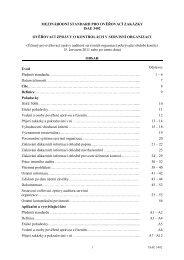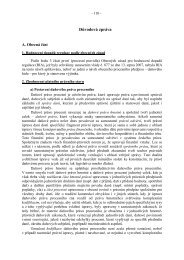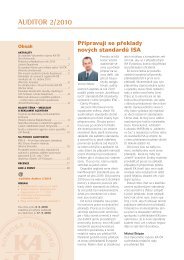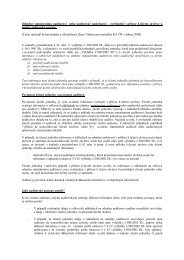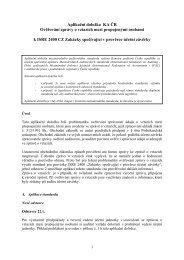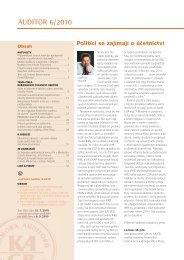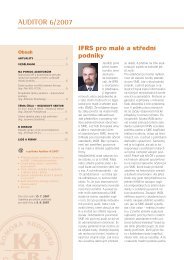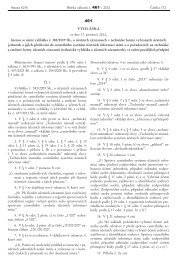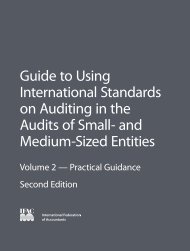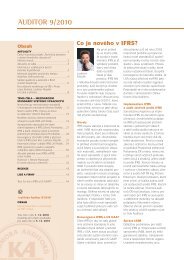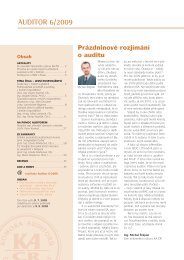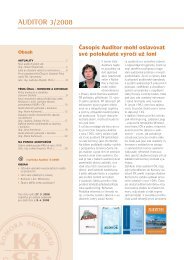Guide to Using International Standards on Auditing in - IFAC
Guide to Using International Standards on Auditing in - IFAC
Guide to Using International Standards on Auditing in - IFAC
You also want an ePaper? Increase the reach of your titles
YUMPU automatically turns print PDFs into web optimized ePapers that Google loves.
121<br />
<str<strong>on</strong>g>Guide</str<strong>on</strong>g> <str<strong>on</strong>g>to</str<strong>on</strong>g> <str<strong>on</strong>g>Us<strong>in</strong>g</str<strong>on</strong>g> <str<strong>on</strong>g>Internati<strong>on</strong>al</str<strong>on</strong>g> <str<strong>on</strong>g>Standards</str<strong>on</strong>g> <strong>on</strong> <strong>Audit<strong>in</strong>g</strong> <strong>in</strong> the Audits of Small- and Medium-Sized Entities Volume 1—Core C<strong>on</strong>cepts<br />
External c<strong>on</strong>firmati<strong>on</strong>s are often used <str<strong>on</strong>g>to</str<strong>on</strong>g> provide audit evidence about completeness of a liability and<br />
existence of an asset. External c<strong>on</strong>firmati<strong>on</strong> can also provides evidence <strong>on</strong> whether the amount has been<br />
accurately recorded <strong>in</strong> the account<strong>in</strong>g records (accuracy) and <strong>in</strong> the appropriate period (cu<str<strong>on</strong>g>to</str<strong>on</strong>g>ff). C<strong>on</strong>firmati<strong>on</strong>s<br />
are less relevant <strong>in</strong> address<strong>in</strong>g valuati<strong>on</strong> issues such as the recoverability of accounts receivable or the<br />
obsolescence of <strong>in</strong>ven<str<strong>on</strong>g>to</str<strong>on</strong>g>ry be<strong>in</strong>g held.<br />
Typical situati<strong>on</strong>s where external c<strong>on</strong>firmati<strong>on</strong> procedures provide relevant audit evidence <strong>in</strong>clude:<br />
• Bank balances and other <strong>in</strong>formati<strong>on</strong> relevant <str<strong>on</strong>g>to</str<strong>on</strong>g> bank<strong>in</strong>g relati<strong>on</strong>ships;<br />
• Accounts receivable balances and terms;<br />
• Inven<str<strong>on</strong>g>to</str<strong>on</strong>g>ries held by third parties at b<strong>on</strong>ded warehouses for process<strong>in</strong>g or <strong>on</strong> c<strong>on</strong>signment;<br />
• Property title deeds held by lawyers or f<strong>in</strong>anciers for safe cus<str<strong>on</strong>g>to</str<strong>on</strong>g>dy or as security;<br />
• Investments held for safekeep<strong>in</strong>g by third parties, or purchased from s<str<strong>on</strong>g>to</str<strong>on</strong>g>ckbrokers but not delivered at<br />
the balance-sheet date;<br />
• Amounts due <str<strong>on</strong>g>to</str<strong>on</strong>g> lenders, <strong>in</strong>clud<strong>in</strong>g relevant terms of repayment and restrictive covenants; and<br />
• Accounts payable balances and terms.<br />
Matters the audi<str<strong>on</strong>g>to</str<strong>on</strong>g>r would c<strong>on</strong>sider are set out below.<br />
Exhibit 10.3-1<br />
Address<br />
Dual Purpose Tests<br />
C<strong>on</strong>firm<strong>in</strong>g Party’s<br />
Knowledge of the<br />
Subject Matter<br />
Ability/Will<strong>in</strong>gness<br />
of C<strong>on</strong>firm<strong>in</strong>g<br />
Party <str<strong>on</strong>g>to</str<strong>on</strong>g> Resp<strong>on</strong>d<br />
Objectivity of the<br />
C<strong>on</strong>firm<strong>in</strong>g Party<br />
Descripti<strong>on</strong><br />
Is there an opportunity <str<strong>on</strong>g>to</str<strong>on</strong>g> obta<strong>in</strong> audit evidence about other important matters at<br />
the same time (such as terms of a c<strong>on</strong>tract, etc.)?<br />
Resp<strong>on</strong>ses will be more reliable if provided by a pers<strong>on</strong> knowledgeable <strong>in</strong> the subject<br />
matter.<br />
C<strong>on</strong>sider the reliability of the evidence obta<strong>in</strong>ed if there is possibility of the<br />
c<strong>on</strong>firm<strong>in</strong>g party:<br />
• Not accept<strong>in</strong>g resp<strong>on</strong>sibility;<br />
• View<strong>in</strong>g a resp<strong>on</strong>se as <str<strong>on</strong>g>to</str<strong>on</strong>g>o costly or time-c<strong>on</strong>sum<strong>in</strong>g;<br />
• Hav<strong>in</strong>g c<strong>on</strong>cerns about potential legal liability;<br />
• Account<strong>in</strong>g for transacti<strong>on</strong>s <strong>in</strong> different currencies; or<br />
• Not treat<strong>in</strong>g the c<strong>on</strong>firmati<strong>on</strong> requests as significant.<br />
C<strong>on</strong>sider the reliability of the evidence obta<strong>in</strong>ed if the c<strong>on</strong>firm<strong>in</strong>g party is a relatedparty.<br />
In such situati<strong>on</strong>s, c<strong>on</strong>sider:<br />
• C<strong>on</strong>firm<strong>in</strong>g additi<strong>on</strong>al details about the subject matter, such as terms of sales<br />
agreements, <strong>in</strong>clud<strong>in</strong>g dates, any rights of return, and delivery terms; and<br />
• Supplement<strong>in</strong>g the c<strong>on</strong>firmati<strong>on</strong> with <strong>in</strong>quiries of n<strong>on</strong>-f<strong>in</strong>ancial pers<strong>on</strong>nel regard<strong>in</strong>g<br />
the subject matter, such as changes <strong>in</strong> sales agreements and delivery terms.<br />
Audit evidence is generally c<strong>on</strong>sidered more reliable when it is obta<strong>in</strong>ed from <strong>in</strong>dependent sources outside the<br />
entity. For this reas<strong>on</strong>, written resp<strong>on</strong>ses <str<strong>on</strong>g>to</str<strong>on</strong>g> c<strong>on</strong>firmati<strong>on</strong> requests received directly from unrelated third parties<br />
may assist <strong>in</strong> reduc<strong>in</strong>g the risk of material misstatement for the related asserti<strong>on</strong>s <str<strong>on</strong>g>to</str<strong>on</strong>g> an acceptably low level.




